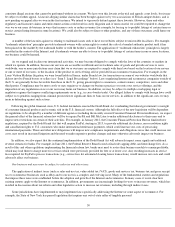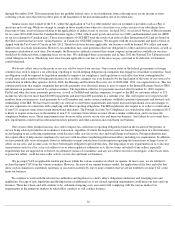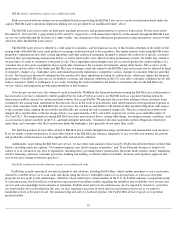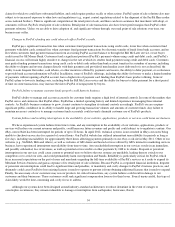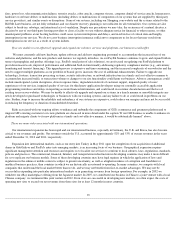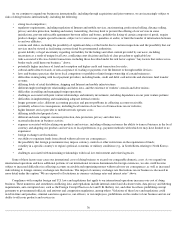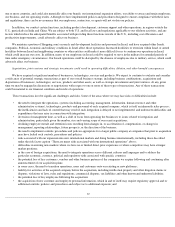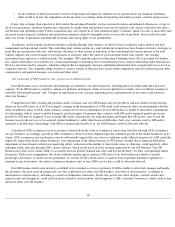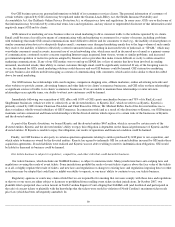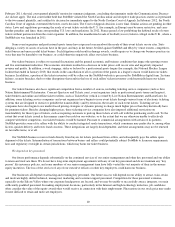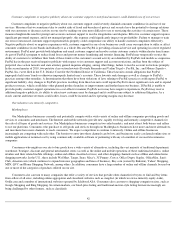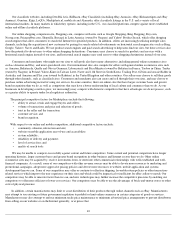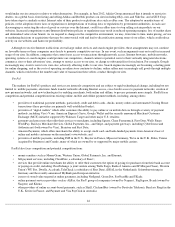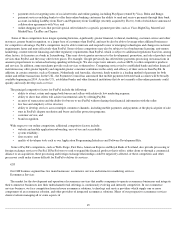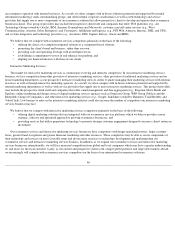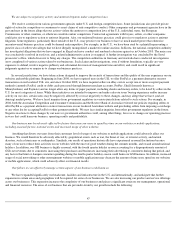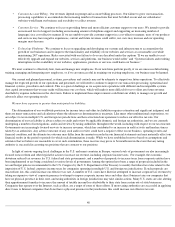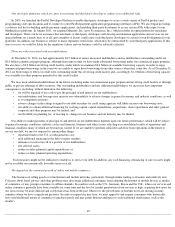eBay 2012 Annual Report Download - page 41
Download and view the complete annual report
Please find page 41 of the 2012 eBay annual report below. You can navigate through the pages in the report by either clicking on the pages listed below, or by using the keyword search tool below to find specific information within the annual report.
Our GSI business processes personal information on behalf of its ecommerce services clients. The personal information of customers of
certain websites operated by GSI's clients may be regulated under the Gramm-Leach-Bliley Act, the Health Insurance Portability and
Accountability Act, the Children's Online Privacy Protection Act, or other privacy laws and regulations. In some cases, GSI's use or disclosure of
that information may be restricted by contractual terms, laws and regulations, and any misuse or unpermitted disclosure of that information could
negatively impact GSI and its clients.
GSI's interactive marketing services business relies on email marketing to drive consumer traffic to the websites operated by its clients.
Email could become a less effective means of communicating with and marketing to consumers for a variety of reasons, including: problems
with technology that make GSI's email communications more difficult to deliver and for consumers to read (e.g., the inability of smart phones or
similar communication devices to adequately display email); consumers may disregard marketing emails due to the large volume of such emails
they receive; the inability of filters to effectively screen for unwanted emails, resulting in increased levels of junk mail, or “SPAM,” which may
overwhelm consumer's email accounts; increased use of social networking sites, which may result in decreased use of email as a primary means
of communication; continued security concerns regarding Internet usage in general from viruses, worms or similar problems; and increased
governmental regulation or restrictive policies adopted by Internet service providers that make it more difficult or costly to utilize email for
marketing communications. If any of our GSI entities were to end up on SPAM lists or lists of entities that have been involved in sending
unwanted, unsolicited emails, their ability to contact customers through email could be significantly restricted. If any of the foregoing were to
occur, the demand for GSI's email marketing solutions could decrease and our GSI business could be harmed. GSI's interactive marketing
services business also utilizes mobile messaging as a means of communicating with consumers, which carries risks similar to those described
above for email marketing.
Our GSI business has relationships with search engines, comparison shopping sites, affiliate marketers, online advertising networks and
other websites to provide content, advertising banners and other links to its clients' ecommerce businesses, and GSI relies on these relationships
as significant sources of traffic to its clients' ecommerce businesses. If we are unable to maintain these relationships or enter into new
relationships on acceptable terms, our ability to attract new customers could be harmed.
Immediately following our acquisition of GSI, eBay sold 100% of GSI's sports merchandise business and 70% of its RueLaLa and
ShopRunner businesses (which we refer to collectively as the divested entities), to Kynetic LLC, which we refer to as Kynetic. Kynetic is
primarily owned by GSI's former Chairman, President and Chief Executive Officer, Mr. Michael Rubin. Each of the divested entities was a
direct or indirect wholly-
owned subsidiary of GSI Commerce. In connection with (and as a result of) the divestiture to Kynetic, our GSI business
maintains certain commercial and financial relationships with the divested entities which expose it to certain risks of the businesses of Kynetic
and the divested entities.
As part of the Kynetic divestiture, we loaned Kynetic and the divested entities $467 million, which is secured by certain assets of the
divested entities. Kynetic and the divested entities' ability to repay this obligation is dependent on the financial performance of Kynetic and the
divested entities. If Kynetic is unable to repay this obligation, our results of operations and financial condition could be harmed.
Finally, our GSI business is also party to certain acquisition agreements relating to entities purchased by GSI prior to our acquisition, and
which relate to businesses owned by the divested entities. Kynetic has agreed to indemnify GSI for certain liabilities incurred by GSI under these
acquisition agreements. If such liabilities were realized and Kynetic was not able or willing to meet its indemnification obligations, GSI would
be liable for them and its business could be harmed.
Our tickets business is subject to regulatory, competitive, and other risks that could harm this business.
Our tickets business, which includes our StubHub business, is subject to numerous risks. Many jurisdictions have anti-scalping laws and
regulations covering the resale of event tickets. Some jurisdictions prohibit the resale of event tickets at prices above the face value of the tickets
or at all, or highly regulate the resale of tickets, and new laws and regulations or changes to existing laws and regulations imposing these or other
restrictions may be adopted that could limit or inhibit our ability to operate, or our users' ability to continue to use, our tickets business.
Regulatory agencies or courts may claim or hold that we are responsible for ensuring that our users comply with these laws and regulations
or that we or our users are either subject to licensure or prohibited from reselling event tickets in their jurisdictions. In October 2007, two
plaintiffs filed a purported class action lawsuit in North Carolina Superior Court alleging that StubHub sold (and facilitated and participated in
the sale) of concert tickets to plaintiffs with the knowledge that the tickets were resold in violation of North Carolina's maximum ticket resale
price law (which has been subsequently amended). In
39



